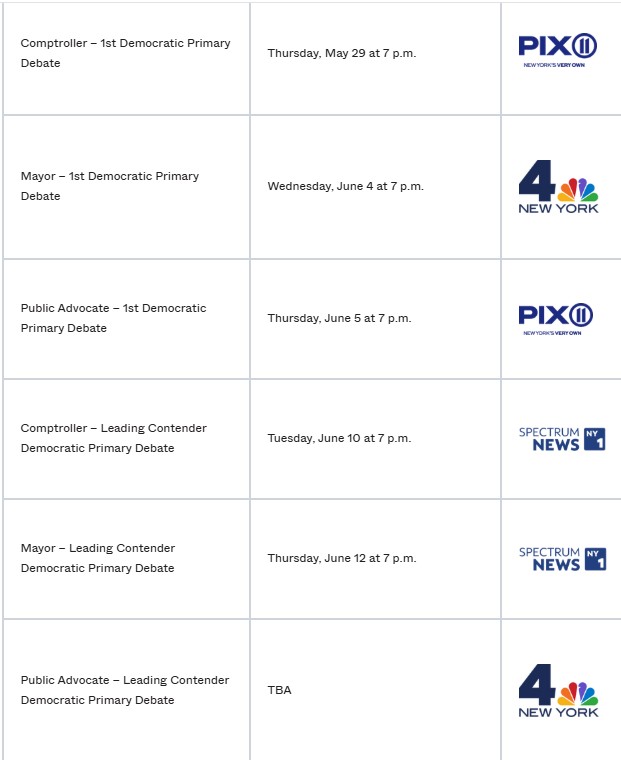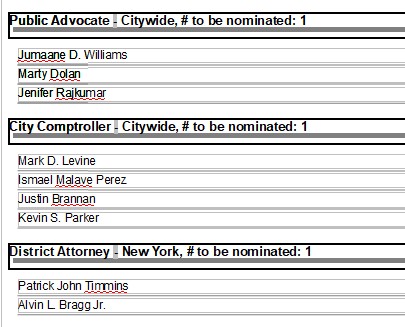Let's Talk Politics.

Register To Vote Online
Register To Vote Online
https://www.vote.nyc/page/register-vote
You may also obtain Registration Forms from libraries, post offices, and most New York City government agencies, or ask us to send you an application in the mail. Call 1-866-VOTE-NYC (1-866-868-3692) or email your mailing address to vote@boe.nyc.ny.us with the name of your borough in the subject line.
Election Calendar
https://elections.ny.gov/political-calendars
Restoration of Voting Rights for Felons
It has been common practice in the United States to make felons ineligible to vote, in some cases permanently. Over the last few decades, the general trend has been toward reinstating the right to vote at some point, although this is a state-by-state policy choice. (See “Recent State Actions” below for a chronology.)
Currently, state approaches to felon disenfranchisement vary tremendously. NCSL has divided states into four categories, as detailed in Table 1 below.
In all cases, “automatic restoration” does not mean voter registration is automatic. Typically, prison officials automatically inform election officials that an individual’s rights have been restored. The person is then responsible for re-registering through normal processes. Some states, such as California, require voter registration information be provided to formerly incarcerated people.
In summary:
- In the District of Columbia, Maine and Vermont, felons never lose their right to vote, even while they are incarcerated.
- In 23 states, felons lose their voting rights only while incarcerated, and receive automatic restoration upon release. Note that in Maryland, convictions for buying or selling votes can only be restored through pardon.
- In 15 states, felons lose their voting rights during incarceration, and for a period of time after, typically while on parole and/or probation. Voting rights are automatically restored after this time period. Former felons may also have to pay any outstanding fines, fees or restitution before their rights are restored.
- In 10 states, felons lose their voting rights indefinitely for some crimes, or require a governor’s pardon for voting rights to be restored, face an additional waiting period after completion of sentence (including parole and probation) or require additional action before voting rights can be restored. These states are listed in the fourth category on Table 1. Details on these states are found in Table 2 below. (click on the link https://www.ncsl.org/elections-and-campaigns/felon-voting-rights )
Key Dates For 2025
Mon, June 9, 2025
Voter Registration Deadline | Primary Election
Voter Registration Deadline | Primary Election
Sat, June 14, 2025
Early Voting | Primary Election
Early Voting | Primary Election
Sat, June 14, 2025 – Sun, June 22, 2025
Primary Election Day
Primary Election Day
Mon, June 9, 2025
Voter registration change of address must be received by the Board of Elections on this date for the Primary Election.Sat, June 14, 2025
Last day voter registration application must be received by the Board of Elections by mail or in person.
Sat, June 14, 2025 – Sun, June 22, 2025
Vote early in person before Primary Election Day!
Early Voting | General Election
Sat, October 25, 2025 – Sun, November 2, 2025
Vote early in person before Election Day!
Election Day
Tue, November 4, 2025
Polls are open 6am-9pm.
What's On The Ballot
2025 is a citywide election year, which means New Yorkers belonging to a party will be heading to the polls in June to choose (and rank) candidates for local offices.
Citywide offices on the ballot
Mayor
City Comptroller
Public Advocate
Borough President
City Council
Additional offices that may appear on your ballot
Delegate to Judicial Convention
Alternate Delegate to the Judicial Convention
District Attorney (Manhattan)
Judge of Civil Court
Surrogate
Male District Leader
Female District Leader
This is a Ranked Choice Voting election
NYC uses Ranked Choice Voting in primary and special elections for city offices. You can rank 5 candidates in order of preference instead of choosing just 1!

Primary Election Debate Schedule


Mayor's Race Democratic

Other Races

Bronx Borough President – The borough president proposes legislation, zoning changes, city-wide budget recommendations, and direction for land-use in the borough. Borough presidents appoint members to the New York City Planning Commission, and members to other local boards.
Vanessa L. Gibson (D)
(Incumbent)
Rafael Salamanca Jr. (D)
New York City Public Advocate – The office of New York City Public Advocate is a citywide elected position, which is first in line to succeed the mayor. The office serves as a direct link between the electorate and city government, effectively acting as an ombudsman, or watchdog, for New Yorkers.
Jumaane Williams (D)
(Incumbent)
Angela Aquino (R)
Gonzalo Duran (C)
Jenifer Rajkumar
Marty Dolan (D)
The Office of Comptroller of New York City is our chief fiscal officer and chief auditing officer. Their job is to make sure that state and local governments are using your tax dollars efficiently and ethically. The comptroller is elected, citywide, to a four-year term and can hold office for two consecutive terms.
Kevin Parker (D)
Danniel Maio (R)
Ismael Malave Perez (D)
Justin Brannan (D)
Mark Levine (D)
Peter Kefalas (R)
Bronx District Attorney
Darcel Clark (D)
New York State Governor New York State Lieutenant Governor New York State Comptroller New York State Attorney General
https://voterlookup.elections.ny.gov/

Trivia
BYLINE: By Fifi Rodriguez
—
1. ANIMAL KINGDOM: What are male bees called?
2. TELEVISION: Which TV streaming network plans to host a new series based on the “Harry Potter” books?
3. GENERAL KNOWLEDGE: How many months have 31 days?
4. U.S. PRESIDENTS: Who was the first president to appear on television?
5. MATH: What is the Roman numeral MMXXV in Arabic numbers?
6. MOVIES: What is the name of the spaceship in the movie “Alien”?
7. LITERATURE: “Nicholas Nickleby” is a novel written by which author?
8. AD SLOGANS: Which airline uses the slogan “Fly the Friendly Skies”?
9. ACRONYMS: What phrase does the real estate acronym DTI stand for?
10. FOOD & DRINK: What are the seeds of a pomegranate called?
Answers
1. Drones.
2. HBO Max.
3. Seven: January, March, May, July, August, October and December.
4. Franklin D. Roosevelt.
5. 2025.
6. Nostromo.
7. Charles Dickens.
8. United Airlines.
9. Debt-to-income ratio.
10. Arils.

